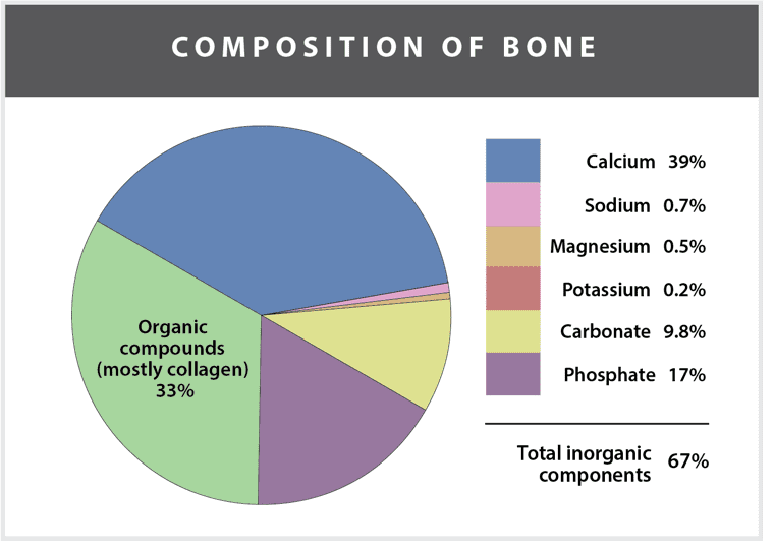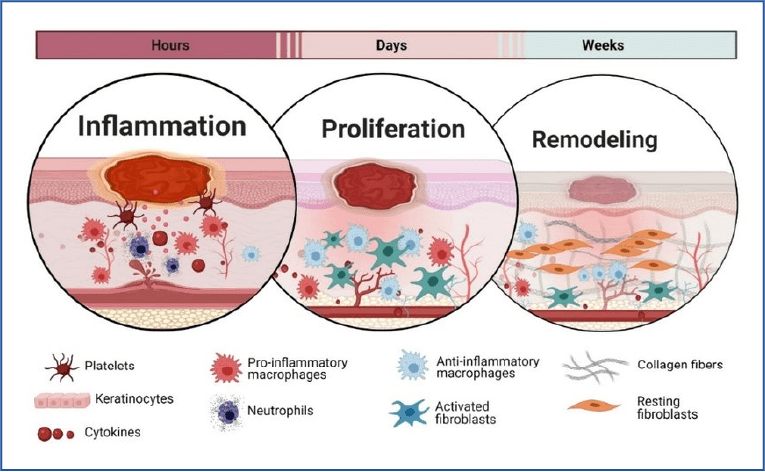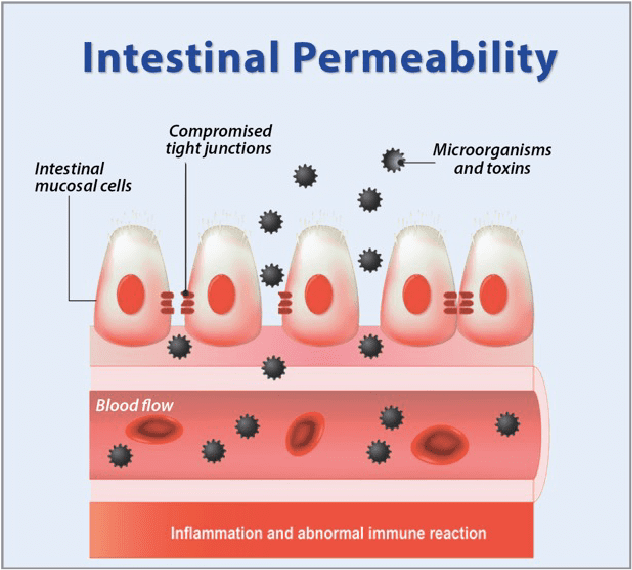In part 1 of this blog series, we discussed the many beauty-related benefits of dietary collagen. But collagen is a multi-tasker that stretches beyond skin deep, extending to promoting healthy bones and joints, supporting the gut lining, and promoting wound healing. Let’s dive in further and discuss the vital role collagen plays throughout the rest of the body.

Bone density and regeneration require more than just minerals
The natural decline of collagen production as we age not only shows up on the body’s exterior (skin, hair, and fingernails) but also in the interior (bones and joints). Lower collagen production may lead to decreased bone mineral density and increased risk of developing osteoarthritis. Bones are not truly solid; in fact, about 30-40 percent of bone is composed of collagen, which serves as the structural matrix upon which mineralization of bone occurs. So yes, the bone needs adequate calcium and minerals, but collagen is also a large component of bone that holds everything together. Studies have demonstrated that collagen peptides may have a positive effect on bone health by increasing bone mineral density and exerting anti-inflammatory activity on osteoarthritis.1


In a recent 2022 randomized one-year study done on postmenopausal women with osteopenia (loss of bone mineral density), adding collagen peptides to a calcium and vitamin D regimen improved bone health measures more than taking calcium and vitamin D alone. There was a significant increase in bone mass in the collagen peptide group.1 Adding collagen peptides may be the key missing piece in bone matrix formation. If not treated properly, low bone mineral density can develop into a more severe condition—namely, osteoporosis.
The surrounding structures of bones such as ligaments and tendons can also weaken over time, leading to stiff and achy joints. Type II collagen is a major building block of cartilage, making it vital for joint health. While collagen won’t generate cartilage in a similar fashion to how it supports bone regeneration, it will help improve symptoms of joint pain and discomfort. This benefit can be attributed to collagen’s amino acid profile and anti-inflammatory properties as it stimulates the body to produce fibroblasts. These renewing cells and amino acids provide support and elasticity to surrounding connective tissue, such as muscle and ligaments.
Interestingly, some collagen sources contain a higher concentration of amino acids that are important components of the collagen triple helix. Marine-sourced collagen typically provides higher amounts of the amino acids hydroxyproline and proline than bovine (cow) or chicken-sourced collagen. These amino acids play key roles in joint stability and elasticity. In fact, lower levels of hydroxyproline has been linked to joint degradation.
Collagen as a building block for wound healing
Type I collagen is the most abundant structural component of the skin matrix, and as such, supplementing with type I collagen can speed up wound healing. There are many biochemical processes involved in healing tissue in the body. Collagen plays a critical role in each wound healing phase as it acts as a structural scaffold in skin tissue formation.

In a randomized double-blind pilot clinical trial, a hydrolyzed collagen-based supplement significantly improved burn wound healing and clinically reduced hospital stay in burn patients (20-30% of their body surface sustained burn wounds).2
Support gut integrity
Collagen peptides can play an important role in promoting a healthy GI tract. Gut integrity can be damaged by many insults such as inflammation, trauma, allergens, infections and dysbiosis (imbalance of gut microbiota). The amino acids in collagen peptides, when consumed, can help restore compromised health caused by these various insults.
When the walls of our intestines weaken, a condition called intestinal permeability may develop (sometimes referred to as “leaky gut”). Intestinal permeability is defined as microscopic holes in the intestinal lining that allows things other than water and nutrients to pass through. These unwanted food particles, allergens, bacteria, and toxins therefore leak their way into the bloodstream, causing a cascade of unpleasant symptoms.

Getting rid of the irritants is the first step in addressing this condition. Healing and sealing this “leakage” in the gut lining is also necessary. Marine-sourced collagen in particular can be an ideal therapeutic for damaged gut lining due to its high type I collagen and amino acid content, especially glycine and glutamine.3 Glycine plays a key role in reducing inflammation as it helps the body produce glutathione (a powerful antioxidant). Glutamine is also crucial for the integrity of the epithelial cells that line the GI tract. In a review published by the Journal of Epithelial Biology & Pharmacology, glutamine was found to provide fuel for metabolism, repair and maintenance of the gut barrier.3
Integrating collagen into your wellness routine
Due to its numerous beneficial effects on the body, collagen can have a profound impact on how we look and feel. With its various roles in promoting healthy bones and joints, supporting the gut lining, restoring skin damage, plus providing beauty benefits, collagen should be considered as a component of a daily wellness routine.
References
1. Argyrou C, Karlafti E, Lampropoulou-Adamidou K, Tournis S, Makris K, Trovas G, Dontas I, Triantafyllopoulos IK. Effect of calcium and vitamin D supplementation with and without collagen peptides on bone turnover in postmenopausal women with osteopenia. J Musculoskelet Neuronal Interact. 2020 Mar 3;20(1):12-17.
2. Bagheri Miyab K, Alipoor E, Vaghardoost R, et al. The effect of a hydrolyzed collagen-based supplement on wound healing in patients with burn: A randomized double-blind pilot clinical trial. Burns. 2020;46(1):156-163.
3. Rao R, Samak G. Role of Glutamine in Protection of Intestinal Epithelial Tight Junctions. J Epithel Biol Pharmacol. 2012 Jan;5(suppl 1-M7):47-54.

